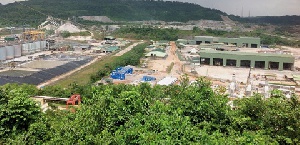- Home - News
- TWI News | TV
- Polls
- Year In Review
- News Archive
- Crime & Punishment
- Politics
- Regional
- Editorial
- Health
- Ghanaians Abroad
- Tabloid
- Africa
- Religion
- Election 2020
- Coronavirus
- News Videos | TV
- Photo Archives
- News Headlines
- Press Release
Business News of Thursday, 14 July 2016
Source: starrfmonline.com
Gold Fields goes off national grid in Sept
Gold Fields Ghana Limited is expected to switch the source of energy supply for its mining operations in the Western region from the national grid to privately generated electricity in September.
According to the company, the switch over is the outcome of a special arrangement between the company and independent power producer (IPP), Genser Energy Ghana Limited, to spare some 18 megawatts (MW) of power for the national grid while insulating the company's operations from the erratic power supply.
Head of Stakeholder Relations and Vice President of the company, David Johnson, said the arrangement will result in the generation of 20MW of electricity each in the Tarkwa and Damang mines within the first two years.
The two mines currently consume a total of 55MW, with the Tarkwa operations, one of the biggest surface mines in West Africa, consuming 38MW. The Damang Mine, however, consumes 17MW.
The production of 20MW each in the two mines, therefore, means that Gold Fields can spare a total of 15MW of electricity for the national grid, which can then be redistributed among new and existing customers of the national power supplier, the Electricity Company of Ghana (ECG).
The excess electricity to be generated from Damang, which is about three megawatts, will also be fed into the national grid, Mr Johnson said.
Cost implications
Beyond shelving the company's operations from the erratic power supply, Mr Johnson said it would also save cost as the alternative power to the grid was comparatively less costly.
With gold prices facing steep declines and cost of production on the increase, Gold Fields has been on the lookout for cost-cutting measures that will help improve its bottom line.
Its target is to bring cost of production per an ounce of gold to US$1,000 from the current US$1,300.
The switch to private power, therefore, comes in handy.
According to Mr Johnson, the Volta River Authority (VRA) had already approved plans for a switch over, making it possible for the two mines to get off the national grid should test runs on the plants conclude successfully.











